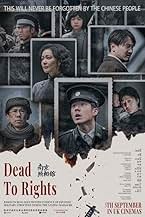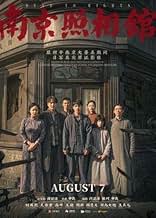Ajouter une intrigue dans votre langueDuring the 1937 Nanjing Massacre, postman A Chang posed as a photo developer, helping Japanese forces while secretly sheltering Chinese refugees. He later risked his life evacuating them and... Tout lireDuring the 1937 Nanjing Massacre, postman A Chang posed as a photo developer, helping Japanese forces while secretly sheltering Chinese refugees. He later risked his life evacuating them and revealing evidence of the atrocities.During the 1937 Nanjing Massacre, postman A Chang posed as a photo developer, helping Japanese forces while secretly sheltering Chinese refugees. He later risked his life evacuating them and revealing evidence of the atrocities.
- Prix
- 3 victoires et 5 nominations au total
Avis en vedette
This is not a movie to be enjoyed. Throughout my watch, I feel my intestines knotted from the blatant display of innumerable brutalities during the Rape of Nanking that were unfathomable strategically and ethically. Not a single body of water in the film isn't red, all bloodied by the 300,000 "swines" that were humans. Laudably, unlike some Sino-Japanese War movies that are purely slogan-calling and hostility-instigating, Dead to Rights has a rather impartial and documentary narrative stance, moving the audience by painstakingly replicating the massacre and letting the plot do the talking. While it's typical in this genre of films to vilify the invaders and traitors, Dead to Rights portrays two brilliant counterexamples: Ito's performative kindness and intrinsic cowardice and Guanghai's suppressed sentiments and deepest despair. With that said, performance of all seven protagonists are spot-on, making the choices, sacrifices and sufferings, though mostly fictional truly believable and resounding. Bravo specifically to Gao Ye, who perfectly captures Yuxiu's change from resiliently hopeful to defenselessly abused to reclaiming justice and avengement, as her powerless tears reflect the most inhumane violations done to countless comfort women. In all, Dead to Rights is a soul-stirring piece of work, but please be prepared for the historical pain it conveys. To intrusion and trampling, I shall retaliate with survival and remembering.
Nanjing Zhao Xiang Guan is a heartbreaking film that exposes the horrors of the Nanjing Massacre. The brutal crimes committed by the Japanese army are depicted with realism, forcing the world to confront this dark chapter. It's a disgrace that such atrocities were ever allowed to happen. This film is a solemn tribute to the victims. A must watch for history and justice. Shameful past , unforgettable part of history.
This film must be seen in theaters. The world needs to know what Japan did the past . The atrocities they committed in China were mirrored in Malaysia, where they similarly tortured and slaughtered our people. Let us cherish the prosperity and happiness of our nation today, and never forget the lessons of history. We must never forget the lessons of history.
10BadCen
Sadly, even to this day, those who committed the massacre are still enshrined in the "Shrine", and there are countless people who are forgetting or even denying this history that truly took place.
This is the significance of this film, to remind the world not to forget this heartrending history. Some people say that such films have been made too many times. But I would say, as long as war criminals are still enshrined in Japanese shrines, there will never be many such films.
This is the significance of this film, to remind the world not to forget this heartrending history. Some people say that such films have been made too many times. But I would say, as long as war criminals are still enshrined in Japanese shrines, there will never be many such films.
First of all, never heard of these events before. The movie blasted that ignorance with incredible cinematography, powerful imagery and realism, and natural acting by the cast. Yes, its in Mandarin language and have to read subtitles, yet the movie draws you in, and is extremely immersive. Its also brutal to reflect the harsh realities, so be prepared. Its definitely a must watch in theatre - the color grading, lighting and sets are just beautiful. This movie exposes human harshness like Schindler's list did. The English title of this film is odd.
Le saviez-vous
- AnecdotesThe film is loosely based on the discovery of a key piece of evidence from the Nanjing Massacre. In 1938, 15-year-old darkroom apprentice Luo Jin secretly compiled photos of the atrocities-taken by Japanese soldiers-into an album and hid it. The album was later discovered by Wu Xuan, another Chinese civilian, who preserved it for years before handing it over to postwar authorities.
- Générique farfeluAs the closing credits came on, a hand puts up black and white photographs of old Nanjing and superimpose it on the same spot of where it was taken in modern-day Nanjing.
Meilleurs choix
Connectez-vous pour évaluer et surveiller les recommandations personnalisées
Détails
Box-office
- Brut – à l'échelle mondiale
- 638 234 $ US
- Durée
- 2h 17m(137 min)
- Couleur
Contribuer à cette page
Suggérer une modification ou ajouter du contenu manquant



























